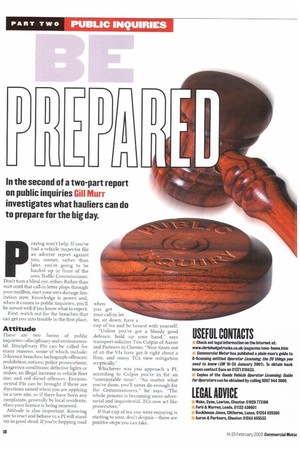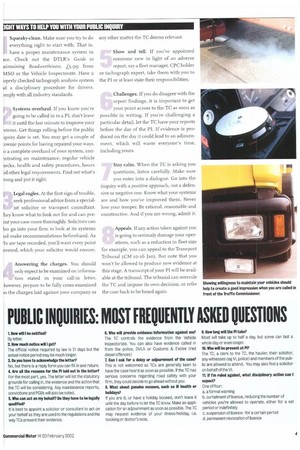PUBLIC INQUIRIES
Page 40

Page 41

If you've noticed an error in this article please click here to report it so we can fix it.
In the second of a two-part report on public inquiries Gill Mtirr investigates what hauliers can do to prepare for the big day.
praying won't help. If you've had a vehicle inspector file an adverse report against you, sooner, rather than later, you're going to be hauled up in front of the area Traffic Commissioner. Don't turn a blind eye, either. Rather than wait until that call-in letter plops through your mailbox, start your own damage limitation now. Knowledge is power and, when it comes to public inquiries, you'll be served well if you know what to expect.
First, watch out for the breaches that can get you into trouble in the first place.
Attitude
There are two forms of public inquiries—disciplinary and environmental. Disciplinary Pis can be called for many reasons, some of which include: 0-licence breaches; tachograph offences; prohibition notices; police prosecutions; iangerous conditions; defective lights or )rakes; an illegal increase in vehicle fleet 3ize; and red diesel offences. Environmental Pis can be brought if there are )bjections raised when you are applying or a new site, or if there have been any :omplaints, generally by local residents, vhen your licence is being renewed.
Attitude is also important. Knowing low to react and behave in a PI will stand rou in good stead. If you're hopping mad when you get your call-in letter, sit down, have a cup of tea and be honest with yourself.
" Unless you've got a bloody good defence, hold up your hand," says transport solicitor Tim Culpin of Aaron and Partners in Chester. "Nine times out of itp the Vis have got it right about a firm, and many TCs view mitigation sceptically."
Whichever way you approach a PI, according to Culpin you're in for an "unenjoyable time". "No matter what you've done, you'll never do enough for the Commissioners," he says. "The whole process is becoming more adversarial and inquisitorial. TCs now act like prosecutors."
If that cup of tea you were enjoying is starting to sour, don't despair—there are positive steps you can take.
IGHT WAYS TO HELP YOU WITH YOUR PUBLIC INQUIRY
Squeaky-clean. Make sure you try to do everything right to start with. That is,
have a proper maintenance system in ace. Check out the DTLR's Guide to aintaining Roadworthiness, L5.99 from MSO or the Vehicle Inspectorate. Have a operly checked tachograph analysis system id a disciplinary procedure for drivers. )mply with all industry standards.
Systems overhaul. If you know you're
going to be called in to a PI, don't leave it until the last minute to improve your stems. Get things rolling before the public 4quiry date is set. You may get a couple of :ownie points for having repaired your ways. o a complete overhaul of your system, conmtrating on maintenance, regular vehicle leeks, health and safety procedures, hours id other legal requirements. Find out what's rong and put it right.
Legal eagles. At the first sign of trouble, seek professional advice from a specialist solicitor or transport consultant. hey know what to look out for and can pre
mt case more thoroughly. Solicitors can !so go into your firm to look at its systems nd make recommendations beforehand. As 'Is are tape recorded, you'll want every point overed, which your solicitor would ensure.
Answering the charges. You should only expect to be examined on information stated in your call-in letter.
-lowever, prepare to be fully cross-examined in the charges laid against your company or any other matter the TC deems relevant.
Show and tell. If you've appointed someone new in light of an adverse report, say a fleet manager. CPC holder
or tachograph expert, take them with you to the PI or at least state their responsibilities.
Challenges. If you do disagree with the report findings, it is important to get your point across to the TC as soon as possible in writing. If you're challenging a particular detail, let the TC have your reports before the day of the PI. If evidence is produced on the day it could lead to an adjournment, which will waste everyone's time, including yours.
Stay calm. When the TC is asking you
questions, listen carefully. Make sure you enter into a dialogue. Go into the inquiry with a positive approach, not a defensive or negative one. Know what your systems are and how you've improved them. Never lose your temper. Be rational, reasonable and constructive. And if you are wrong, admit it.
Appeals. If any action taken against you
is going to seriously damage your oper
ations, such as a reduction in fleet size for example, you can appeal to the Transport Tribunal (CM io-16 Jan). But note that you won't be allowed to produce new evidence at this stage. A transcript of your PI will be available at the tribunal. The tribunal can overrule the TC and impose its own decision, or refer the case back to be heard again.
USEFUL CONTACTS
Check out legal information on the Internet at: www.chrishodgetrucks.co.uk/pagecma/cma-home.htm
Commercial Motor has published a plain man's guide to 0-licensing entitled Operator Licensing: the 20 things you need to know (CM 18-24 January 2001). To obtain back issues contact Esca on 01371 810433.
Copies of the Goods Vehicle Operator Licensing: Guide for Operators can be obtained by calling 0207 944 3000.
LEGAL ADVICE
Wake, Dyne, Lawton, Chester. 01829 773106 Ford & Warren, Leeds. 01132 436601 Backhouse Jones, Clitheroe, Lancs. 01254 828300 Aaron & Partners, Chester. 01244 405533
PUBLIC INQUIRIES: MOST FREQUENTLY ASKED QUESTIONS
1. How will I be notified? By letter.
2. How much notice will I get?
The official notice required by law is 21 days but the actual notice period may be much longer.
1. Do you have to acknowledge the letter?
No, but there is a reply form you can fill in and return. 4, are all the reasons for the PI laid out In the letter? For the most part, yes. The letter will list the statutory grounds for calling in, the evidence and the action that the TC will be considering. Any maintenance reports, convictions and PG9s will also be noted.
5. Who can act on my behalf? Do they have to be legally quallfledP
tt is best to appoint a solicitor or consultant to act on your behalf as they are used to the regulations and the way TCs present their evidence. 6. Who will provide evidence/informatIon against me? The IC controls the evidence from the Vehicle Inspectorate. You can also have evidence called in from the police, DVLA or Customs & Excise (red diesel offences)
7. Can I ask for a delay or adjournment of the case? This is not welcomed as TCs are generally keen to have the case heard as soon as possible. If the TC has serious concerns regarding road safety with your firm, they could decide to go ahead without you.
8. What about genuine excuses, such as NI health or holldaysP If you are ill, or have a holiday booked, don't leave it until the day before to let the TC know. Make an application for an adjournment as soon as possible. The TC may request evidence of your illness/holiday, i.e. booking or doctor's note. 9.110w long will the PI take?
Most will take up to half a day, but some can last a whole day or even longer.
10. Who MI be present at PIP The TC, a clerk to the TC, the haulier, their solicitor, any witnesses (eg VI, police) and members of the public are allowed to attend. You may also find a solicitor on behalf of the VI.
11. If I'm ruled against, what disciplinary action can I expectP One of four: a. a formal warning b. curtailment of licence, reducing the number of vehicles you're allowed to operate, either for a set period or indefinitely c. suspension of licence for a certain period d. permanent revocation of licence












































































































































